Vintage Treasures: Citizen in Space by Robert Sheckley
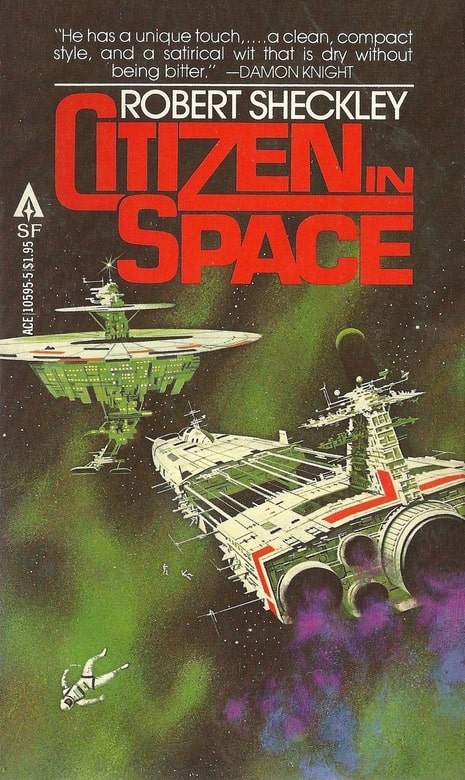 |
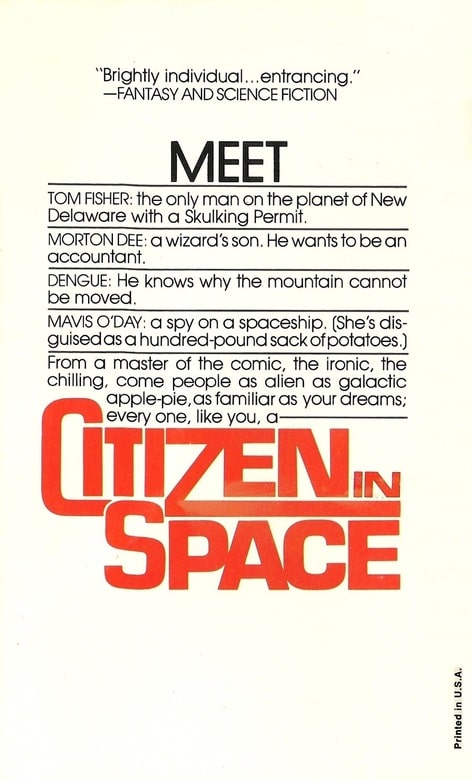 |
Citizen in Space (Ace Books, December 1978). Cover by Dean Ellis
Robert Sheckley isn’t discussed much these days. But he had a towering reputation as an SF short story writer in the mid-20th Century. He sold his first story in 1951, and quickly became one of H.L. Gold’s stable of writers at Galaxy, one of the leading science fiction magazines of the 1950s.
Sheckley was a very prolific writer of satirical SF, and he produced hundreds of short stories in his career. His first collection, Untouched by Human Hands, was published by Ballantine in 1954, followed by Citizen in Space (Ballantine, 1955), Pilgrimage to Earth (Bantam, 1957) and two in 1960: Notions: Unlimited and Store of Infinity, both from Bantam.
Many of Sheckley’s best collections were reprinted in the late 70s by Ace books, which is when I discovered them. They made very entertaining reading then, and they still do today.
[Click the images for space-sized versions.]
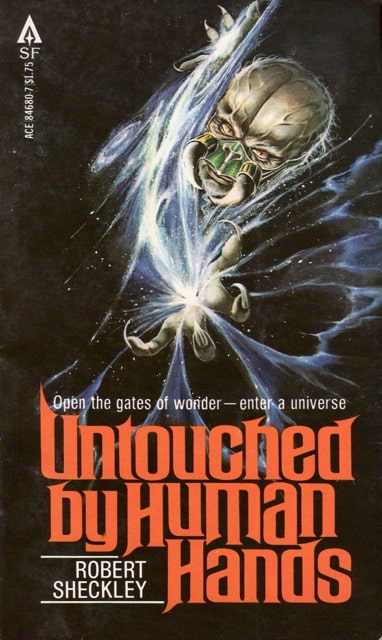 |
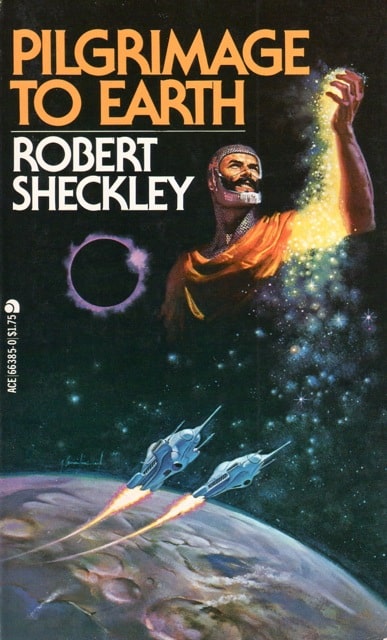 |
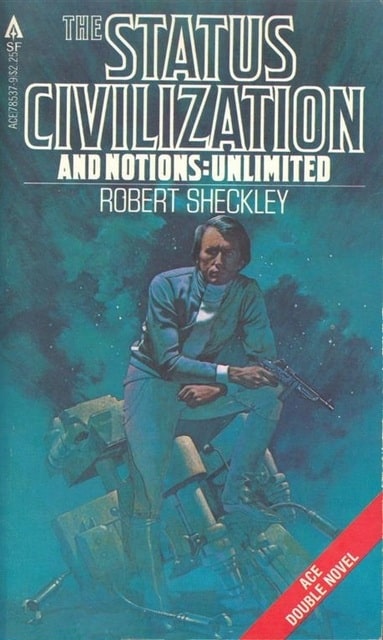 |
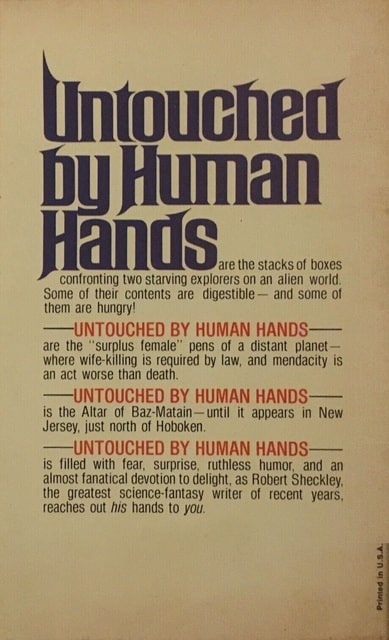 |
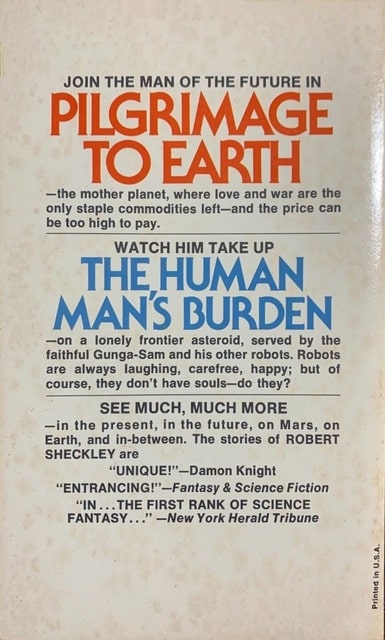 |
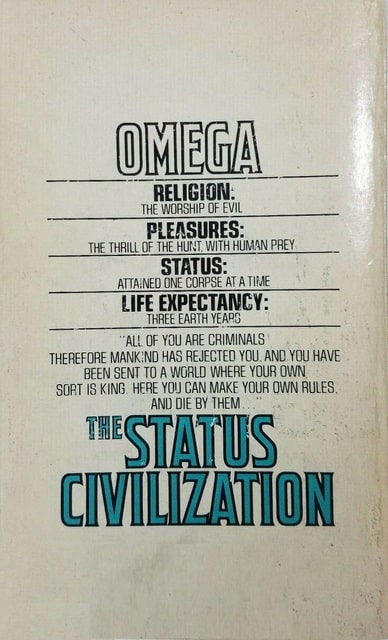 |
Ace paperback editions of Sheckley: Pilgrimage to Earth, Untouched by Human Hands, and The Status Civilization
and Notions: Unlimited (Ace Books, 1978, 1979, 1979). Covers by Olivia, Jordi Penalva, and David Bergen
Wikipedia has a concise summary of his satirical style:
He was best known for his several hundred short stories, which he published in book form as well as individually. Typical Sheckley stories include “Bad Medicine” (in which a man is mistakenly treated by a psychotherapy machine intended for Martians), “Protection” (whose protagonist is warned of deadly danger unless he avoids the common activity of “lesnerizing”, a word whose meaning is not explained), and “The Accountant” (in which a family of wizards learns that their son has been taken from them by a more sinister trade — accountancy). In many stories Sheckley speculates about alternative (and usually sinister) social orders, of which a good example is the story “A Ticket to Tranai” (which tells of a sort of Utopia designed for human nature as it actually is, which turns out to have terrible drawbacks).
Sheckley’s early stories include the far future AAA Ace detective agency series. In these tales, the two partners face unusual problems often related to human incompetence or laziness.
“The Accountant” and “A Ticket to Tranai” are both included in his second collection Citizen in Space, which may have been the first Sheckley book I ever purchased.
Joachim Boaz has a thoughtful review at Science Fiction Ruminations.
Robert Sheckley’s easily one of the best SF satirists in the short story form. The collection Citizen in Space (1955), although not as uniformly brilliant as the collection Store of Infinity (1960), is chock full of gems including “The Luckiest Man in the World” (1955), “Something for Nothing” (1954), “Ask a Foolish Question” (1953), and “Skulking Permit” (1954). Sheckley exposes in all their glory the vast variety of humankind’s follies and utopic delusions.
Later in the 50s and in the span of 60s his visions would become increasingly searing and metafictional. This early collection is more on the lighthearted side although the more allegorical stories hint at the heights Sheckley would reach later in his career. Highly recommended for all fans of classic SF, especially works of a witty/satirical bent.
“Hunting Problem” (1955): Alien boy scouts of “the Soaring Falcon Patrol” in order to acquire scout badges take solid form (from their normal gaseous form fueled by cosmic radiation) and practice the skills of their “pioneering ancestors.” This thrusts them in direct confrontation with humankind. In order to acquire the hunting badge all they need is a human pelt! The situation creates a rather hilarious narrative in which Sheckley cannot help but level numerous barbs at the rhetoric and traditions of the boy scouts.
“The Luckiest Man in the World” is easily one of the best stories in the collection. Our main character, a hilariously unreliable narrator, recounts how “amazingly well off” his life is alone at a weather station in Patagonia. Soon, the reader discovers the reality of the post-apocalyptical landscape. Sheckley excels at the flash SF form — this one clocks in at a mere three pages but packs a punch.
“A Ticket to Tranai” (1955): The longest story in the collection explores yet another human foible, utopic delusions. Marvin Goodman wants to cross the Milky Way to get to the fabled world of Tranai. Marvin’s a “natural-born crusader” who passionately devotes his all to every cause (110) but everyone around him is too apathetic to care. While in a bar he overhears an old captain expound on the wonders of Tranai, the only “real” utopia where there is no crime, free enterprise, limited government, etc. Marvin sets off! Of course, Tranai is not exactly like he expected. And when he returns with his idealism shattered, he too laments about the glories of Tranai, the only “real” utopia. Which of course, really only a figment of the imagination, an unattainable ideal.
“The Battle” (1954): Mechanical armies controlled by humankind confront the forces of the antichrist in the Last Battle. A priest laments pitiable, “it should be the people’s battle” not mechanized war bots in battle array. A hilarious allegory of the unintentional “dangers” of technology…
“Skulking Permit” (1954) is the best story in the collection. Tom Fisher lives on a forgotten Earth colony of New Delaware. After years out of contact with the home planet, Earth finally decides to pay a visit to see if the colony is up to snuff with their requirements repressive government i.e. generals, crime, alien phobia, paranoia, are all needed to be an Earth society. But, New Delaware is something of a utopia and Tom Fisher is by the mayor asked to skulk around and commit crimes to satisfy the inspectors. But who is he going to murder especially since he’s not the murdering type?
“Citizen in Space” (1955): In a similar style to “The Luckiest Man in the World,” the narrator of “Citizen in Space” believes the horrible police state he lives in is normal and not all that bad. He is even disappointed that he is not important enough to receive be allotted additional spies (one gets the sense that most of America’s population is employed to spy on everyone else). And, his spy happens to be inept. Clearly a satire of the American paranoia, “Citizen in Space” is easily one of the funniest stories in the collection: “I snapped off the intercom. I should have felt wonderful. Two full-time Spies were watching me. It meant I was someone, someone to be watched”.
Check out the full review here.
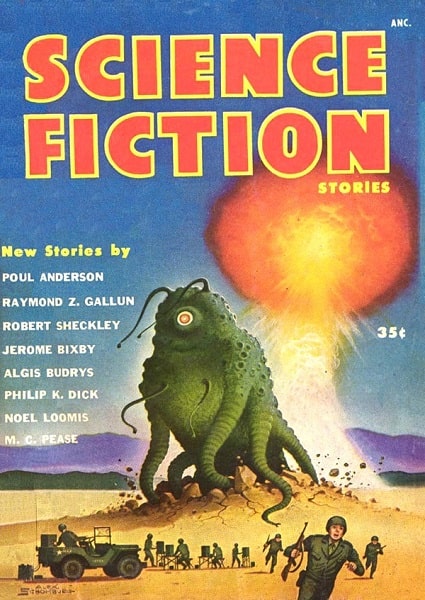 |
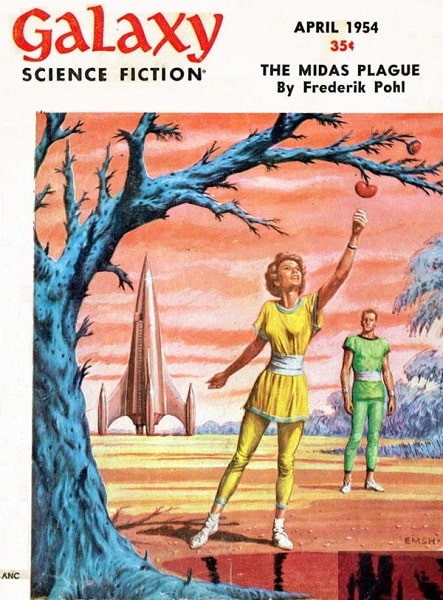 |
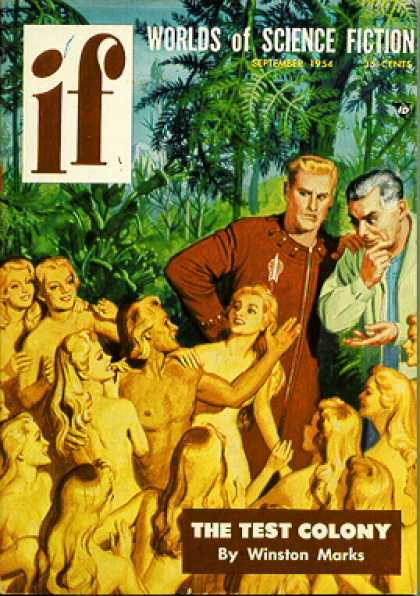 |
Some of the magazines these stories originally appeared in: Science Fiction Stories #1, 1953,
Galaxy, April 1954, and If, September 1954. Covers by Alex Schomburg, Emsh, and Max Reach
Here’s the complete TOC for Citizen in Space.
“The Mountain Without a Name” (Citizen in Space, 1955)
“The Accountant” (The Magazine of Fantasy and Science Fiction, July 1954)
“Hunting Problem” (Galaxy Science Fiction, September 1955)
“A Thief in Time” (Galaxy Science Fiction, July 1954)
“The Luckiest Man in the World” (Fantastic Universe, February 1955)
“Hands Off” (Galaxy Science Fiction, April 1954)
“Something for Nothing” (Galaxy Science Fiction, June 1954)
“A Ticket to Tranai” (Galaxy Science Fiction, October 1955)
“The Battle” (If, September 1954)
“Skulking Permit” (Galaxy Science Fiction, December 1954)
“Citizen in Space” (Playboy, September 1955)
“Ask a Foolish Question” (Science Fiction Stories #1, 1953)
Our previous coverage of Robert Sheckley includes:
The Wonderful World of Robert Sheckley
The Robot Who Looked Like Me
Crompton Divided
Wildside Double #6 — Alien StarSwarm by Robert Sheckley / Human’s Burden by Damien Broderick & Rory Barnes
Three Apocalyptic Anthologies: After the Fall, edited by Robert Sheckley
Citizen in Space was published as a paperback original by Ballantine in December 1955, and reprinted by Ace Books in December 1978. It is 264 pages, priced at $1.95. The cover is by Dean Ellis. Open Road Media released a digital edition in 2014.
See all our recent Vintage Treasures here.
One of the first SF writers I read back in the early 60’s. Some of his novels I remember as being quite good such as The journey of Joenes and The status Civilization.
Steve,
I’ve always been intrigued by David Bergen’s delightful cover for the 1979 Ace edition of The Journey of Joenes (below), with its jaunty space traveler. But I’ve never read it. Tell me more!
I reviewed The Journey of the Joenes (variant title: Journey Beyond Tomorrow) (1962) on my site. It’s, in my view, his best novel (that I’ve read so far). https://sciencefictionruminations.com/2014/08/15/book-review-journey-beyond-tomorrow-variant-title-the-journey-of-joenes-robert-sheckley-1962/
Joachim,
That’s a terrific review. Thanks for the link!
For everyone else, here’s an excerpt:
Check out the full thing at the link above.
As a happy reader of Robert Sheckley, I am always surprised at his lack of general recognition, given his talent for comedy and satire. I thought that the NY Review of Books collection, Store of the Worlds (26 stories, including his most widely known ones like “Seventh Victim” (movie title: The 10th Victim ) and “Can You Feel Anything When I Do This?” (published in Playboy and pretty much just what the title promises)), would make more of a splash, but it appears not even a prestige literary publisher can elevate Mr. Sheckley to the same level as John Collier, another delightfully surreal commentator on life in the 20th Century. Ah well, just fewer folks with whom to share some laughs over the AAA Ace stories.
Eugene,
Store of the Worlds is a terrific book, especially if you’re looking for an introduction to Sheckley (heck, or even if you’ve been reading him for years). It was released over 10 years ago and is still in print, which warms my heart.
Sheckley is one of my most admired “forgotten old sf writers”, and considering how many people fall into that category, that’s quite an accomplishment. Whenever anyone goes into raptures over Douglas Adams, I can be heard grinding my teeth and muttering “Sheckley, Sheckley, Sheckley!”
Thomas,
We should probably make a Black Gate-approved list of the most deserving Forgotten Old SF Writers.
Although, having said that, the Cordwainer Smith Rediscovery Award, given out every year at Readercon since 2002, has done an admirable job already. Here’s the list of recipients so far:
Olaf Stapledon, 2001
R.A. Lafferty, 2002
Edgar Pangborn, 2003
Henry Kuttner and C.L. Moore, 2004
Leigh Brackett, 2005
William Hope Hodgson, 2006
Daniel F. Galouye, 2007
Stanley G. Weinbaum, 2008
A. Merritt, 2009
Mark Clifton, 2010
Katherine MacLean, 2011
Fredric Brown, 2012
Wyman Guin, 2013
Mildred Clingerman, 2014
Clark Ashton Smith, 2015
Judith Merril, 2016
Seabury Quinn, 2017
Frank M. Robinson, 2018
Carol Emshwiller, 2019
Rick Raphael [de], 2020
D. G. Compton, 2021
An admirable list indeed, but it’s high time they got around to Avram Davidson!
I don’t know much about the criteria (eg. how long they can be dead, or if you work has to be out of print, etc) so I don’t know whether to be cranky that they haven’t included Clifford D. Simak, Edmond Hamilton, Fritz Leiber, Eric Frank Russel, Walter M. Miller, William Tenn, James H. Schmitz, C. M. Kornbluth, Murray Leinster, H. Beam Piper, Charles R. Tanner, Theodore Sturgeon, Richard Matheson, Alfred Bester, Jack Vance, H. G. Wells, Frederik Pohl…
But looking over their list above, I hesitate to suggest any names they should NOT have on it. So I guess I’ll just have to wait impatiently until they get around to a few more of my favorites. 🙂
In case you didn’t know AD 100 coming in 2023 for Avram’s 100th birthday. 100 unpublished or uncollected stories. Spread the word. 🙂
Thanks Seth! And I certainly didn’t know. Who is the publisher??
I remember Sheckley primarily for Immortality Inc*. I just assumed he was one of those authors everybody knew about, as the book was well written and there was a very real existentialist angst bubbling away beneath all that black humour. Plus that running gag about how the mc has ended up in a body utterly unlike his original one? (he meets his soulmate but she’s into lanky professor types whereas he’s now short and musclebound).
* made – as we all know – into a pretty terrible film starring Mick Jagger and Emilio Estevez.
Aonghus,
I totally forgot that Immortality Inc was the basis for FREEJACK, the Emilio Estevez movie. I saw it in theaters in 1992, and have pretty much forgotten everything about it. (Maybe that’s a good thing.)
I love the Jordi Penalva cover on the 1978 Ace reprint though (below). To my collector’s mind, the Ace Sheckley editions are the ones to get. 🙂
Is H G Wells really a forgotten writer? Aside from the obvious merits of the work these authors have published, what are the criteria for becoming a writer worthy of being rediscovered? And what about writers who have been around for aeons but have hardly been discovered at all? For example, how many people have heard of Pu Sung Ling? A writer whose works, as I understand it, are esteemed as classics in China on a par with Shakespeare in our culture but who is hardly known in the west. I suppose I am quibbling with the word “rediscovered” but can’t think of a better term . Oh and I agree about Douglas Adams. Much as it pains me as a Brit to say it, Sheckley beats Adams hands down.
Hi Neil,
Great questions! I totally think someone like Pu Sung Ling (whom I’m unfamiliar with) should be considered. The 2020 winner of the Cordwainer Smith Rediscovery Award, Rick Raphael, is a German science fiction writer whom I’ve never heard of.
As for H.G. Wells… he may not be forgotten, but he’s not READ today. At least not the way he deserves to be. He is one of the giants of the genre, and remains thoroughly relevant.
There’s more info how the Rediscovery Award is given out (it’s selected by a group of judges each year) at their website:
http://www.cordwainer-smith.com/about-cordwainer-smith-rediscovery-award.htm
If you look up Pu Sung Ling, the most popular hit is Wikipedia where he is Pu Songling. Penguin has published a translation of his Strange Tales from a Chinese Studio which is still available. I first came across him when I picked up an old book called Chinese Ghost and Love Stories, in one of my favourite second hand bookshops – Barter Books, Alnwick, Northumberland. He mixes fairy tale, ghost stories, fantasy in equal measure and the result is simply stunning. I have no knowledge of any of the Chinese languages but do know that he is highly regarded as a literary figure. His tale of the love affair with an ant princess is truly stunning. Go check him out.
Robert Sheckley was big on the old 50s radio program X Minus One. He had like 8 stories in it, as well as what he wrote under at least one pen name (Finn O’Donavon).
For your listening pleasure I’m going to link to “Skulking Permit” https://www.youtube.com/watch?v=lbn6GlhAtQw , and “A Wind is Rising”- https://www.youtube.com/watch?v=21tsygt39mo
Adrian, over at Relic Radio they have tons of X Minus Ones, plus other radio sf, plus Inner Sanctum, Lights Out etc. Well worth a visit! https://www.relicradio.com/otr/